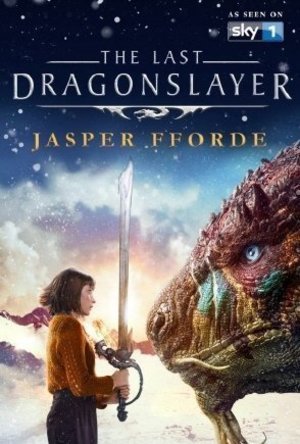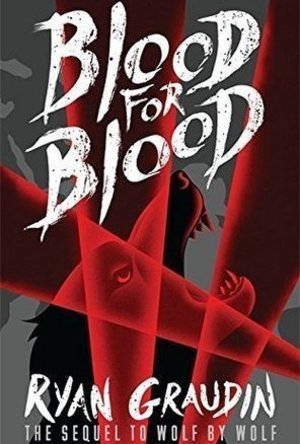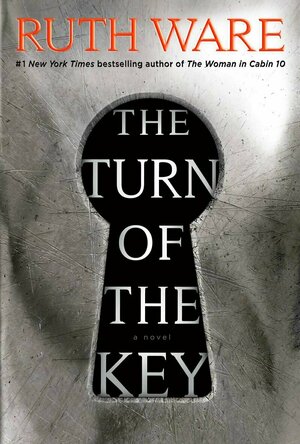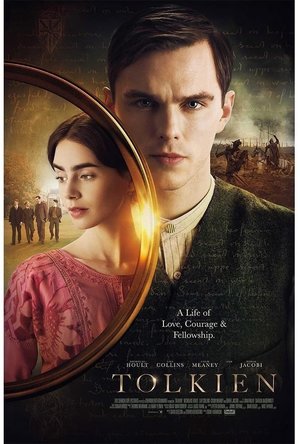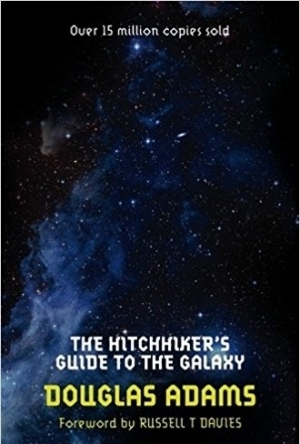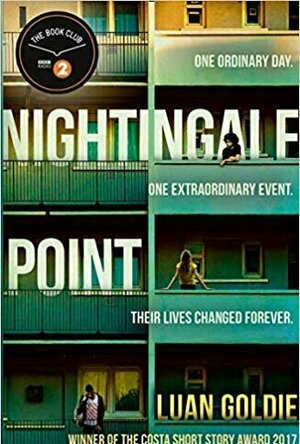Search
Search results
Hazel (1853 KP) rated The Last Dragonslayer (The Last Dragonslayer, #1) in Books
Dec 17, 2018
<i>I received this book for free through Goodreads First Reads.</i>
The recent dramatisation on Sky1 over the Christmas period (which I have not watched) has prompted the release of a new edition of Jasper Fforde’s <i>The Last Dragonslayer</i>, which originally appeared in bookstores six years ago. Fforde is perhaps best known for his <i>Thursday Next</i> series, a comical science-fiction story, but he proves he can equally tackle fantasy with this tale about an intrepid, young dragonslayer.
In the slightly fictional Kingdom of Hereford, part of the Ununited Kingdom, is a home and employment agency for mystical artisans. Over the past decades, magic has begun to diminish, leaving soothsayers and sorcerers struggling to find jobs. Jennifer Strange, although only fifteen, is temporarily in charge of running the agency, Kazam, and looking after the building’s cantankerous inhabitants. Although competent with her position, Jennifer soon finds herself out of her depth when wizards begin having prescient visions of the death of the last living dragon.
Able to ignore the prophecy at first, Jennifer becomes deeply involved once it is revealed that she is the foretold dragonslayer. Being both helped and hindered by friends and obdurate sorcerers, Jennifer desperately tries to prevent the shocking prediction from coming true. However, as she quickly discovers, it is impossible to outrun your own fate, especially if Big Magic is involved.
<i>The Last Dragonslayer</i> is a fun book to read that, despite the slow build up to the promised dragon story, is humorous and engaging throughout. Jasper Fforde is a particularly witty writer who uses genuine, intelligent, and often subtle, puns rather than demeaning himself by resorting to crude jokes. Although some may dismiss dragons, magic and fantasy as fatuous nonsense, it is clear Fforde is writing for the more intellectual reader.
The way in which the story is executed, particularly the conclusion, borders on genius and deserves to be highly praised. Magic is a concept that has been written about thousands of times, and also mocked in parodies of well-known literature. <i>The Last Dragonslayer</i> successfully combines fantasy and humour in a way that avoids ridicule.
Some may argue that <i>The Last Dragonslayer</i> is a young adult novel due to the age of the protagonist and the less highfaluting content in comparison to Fforde’s other works. On the other hand, Jennifer Strange is a character that appears a lot older than she actually is, and is involved in events and satire that a younger audience may not be able to fully appreciate. Therefore, there is nothing to prevent readers of all ages from enjoying this book, and the rest of the series, of course.
I particularly enjoyed reading Jasper Fforde’s <i>The Last Dragonslayer</i>. I found it engaging and amusing, loved the characters, and was slightly disheartened when the book ended earlier than I expected – that is the downside of having sneak peak chapters at the rear of the paperback! Of all the Jasper Fforde books I have read (<i>The Eyre Affair</i>, 2001 and <i>Shades of Grey</i>, 2009) <i>The Last Dragonslayer</i> has been my favourite. Perhaps the potential younger target audience prevented me from getting lost, unlike in the complexity of the other stories. As long as you can forgive the author for his fish fetish and preoccupation with marzipan, you will absolutely love this book.
The recent dramatisation on Sky1 over the Christmas period (which I have not watched) has prompted the release of a new edition of Jasper Fforde’s <i>The Last Dragonslayer</i>, which originally appeared in bookstores six years ago. Fforde is perhaps best known for his <i>Thursday Next</i> series, a comical science-fiction story, but he proves he can equally tackle fantasy with this tale about an intrepid, young dragonslayer.
In the slightly fictional Kingdom of Hereford, part of the Ununited Kingdom, is a home and employment agency for mystical artisans. Over the past decades, magic has begun to diminish, leaving soothsayers and sorcerers struggling to find jobs. Jennifer Strange, although only fifteen, is temporarily in charge of running the agency, Kazam, and looking after the building’s cantankerous inhabitants. Although competent with her position, Jennifer soon finds herself out of her depth when wizards begin having prescient visions of the death of the last living dragon.
Able to ignore the prophecy at first, Jennifer becomes deeply involved once it is revealed that she is the foretold dragonslayer. Being both helped and hindered by friends and obdurate sorcerers, Jennifer desperately tries to prevent the shocking prediction from coming true. However, as she quickly discovers, it is impossible to outrun your own fate, especially if Big Magic is involved.
<i>The Last Dragonslayer</i> is a fun book to read that, despite the slow build up to the promised dragon story, is humorous and engaging throughout. Jasper Fforde is a particularly witty writer who uses genuine, intelligent, and often subtle, puns rather than demeaning himself by resorting to crude jokes. Although some may dismiss dragons, magic and fantasy as fatuous nonsense, it is clear Fforde is writing for the more intellectual reader.
The way in which the story is executed, particularly the conclusion, borders on genius and deserves to be highly praised. Magic is a concept that has been written about thousands of times, and also mocked in parodies of well-known literature. <i>The Last Dragonslayer</i> successfully combines fantasy and humour in a way that avoids ridicule.
Some may argue that <i>The Last Dragonslayer</i> is a young adult novel due to the age of the protagonist and the less highfaluting content in comparison to Fforde’s other works. On the other hand, Jennifer Strange is a character that appears a lot older than she actually is, and is involved in events and satire that a younger audience may not be able to fully appreciate. Therefore, there is nothing to prevent readers of all ages from enjoying this book, and the rest of the series, of course.
I particularly enjoyed reading Jasper Fforde’s <i>The Last Dragonslayer</i>. I found it engaging and amusing, loved the characters, and was slightly disheartened when the book ended earlier than I expected – that is the downside of having sneak peak chapters at the rear of the paperback! Of all the Jasper Fforde books I have read (<i>The Eyre Affair</i>, 2001 and <i>Shades of Grey</i>, 2009) <i>The Last Dragonslayer</i> has been my favourite. Perhaps the potential younger target audience prevented me from getting lost, unlike in the complexity of the other stories. As long as you can forgive the author for his fish fetish and preoccupation with marzipan, you will absolutely love this book.
Hazel (1853 KP) rated Blood for Blood (Wolf By Wolf #2) in Books
Dec 17, 2018
<i>This eBook was provided by the publisher via NetGalley in exchange for an honest review </i>
Ryan Graudin blew readers away with her alternate historical novel <i>Wolf by Wolf</i>. Now it is time to conclude the imaginative narrative with the highly anticipated sequel, <i>Blood for Blood. </i>Continuing from the precise moment Yael pulled the trigger on the Führer’s doppelgänger, the reader is thrown into a lively story of twists and turns, where danger lives around every corner.
To recap, it is 1956 and Hitler has won the war. Germany, or Germania, is ruling over Europe and many countries in Asia and Africa. Yael is a Jewish girl who a doctor experimented on whilst she was detained in a concentration camp. As a result of the brutal medical treatment, Yael is a successful result of the Doppelgänger Project – she can now change her physical appearance and anatomy at will.<i> Wolf by Wolf</i> focused on Yael and the resistance’s attempt to win a prestigious motorcycle race in order to get close to the Führer and end his life. As it turns out, Yael is not the only person with this skin shifting ability.
On the run with the entire world knowing her secret, Yael is desperate to make contact with the resistance leaders and continue with their plot to assassinate Hitler. However, unable to leave innocent people to suffer at the hands of the National Socialists, Yael ends up being accompanied and hindered by two Aryan boys, Luka and Felix. Yet with no way of knowing who can be trusted, Yael is taking a fatal risk by helping others instead of saving herself.
Despite circumstances, the blossoming romance that began to advance toward the end of the first book continues to feature in <i>Blood for Blood</i> as characters begin to rely on and trust each other. Nonetheless, constant plot developments obstruct all thoughts of a happy ending. Clever twists and gradually emerging truths prevent any opportunity for rest or safety.
<i>Wolf by Wolf </i>was an exciting, new concept for young adult readers, answering a “what if” question about the second world war. Yet the historical setting – albeit fictional – was impeded by the focus on the Axis Tour as characters raced from Germania to Tokyo. In contrast, <i>Blood for Blood</i> leaves all distractions behind, giving full attention to the life and danger under Hitler’s dictatorship. Despite Germany/Germania’s triumphant win, war is still raging throughout Europe. Anyone not meeting the Aryan description is at risk of death or deportment. Strictly speaking, the situation described must look similar, if not the same, as the true result of Nazi ruling.
Ryan Graudin is a formidable writer with the ability to make fiction seem like reality. Despite the added science fiction twist, the imaginative scenario is so well researched and planned that it becomes almost believable. Graudin comes at the story from so many directions, evidencing the effort put into creating the thrilling plot. It is one thing to be able to string words together, but to make them come alive it takes a genius.
<i>Blood for Blood</i> is by far the better of the two novels, making it the perfect conclusion to a fantastic two-part story. Beginning with explosive action and not stopping until its heart-wrenching conclusion, <i>Blood for Blood</i> will satisfy readers of all ages and genres. Those who have read <i>Wolf by Wolf</i> definitely must get their hands on this amazing sequel. You will not be disappointed.
Ryan Graudin blew readers away with her alternate historical novel <i>Wolf by Wolf</i>. Now it is time to conclude the imaginative narrative with the highly anticipated sequel, <i>Blood for Blood. </i>Continuing from the precise moment Yael pulled the trigger on the Führer’s doppelgänger, the reader is thrown into a lively story of twists and turns, where danger lives around every corner.
To recap, it is 1956 and Hitler has won the war. Germany, or Germania, is ruling over Europe and many countries in Asia and Africa. Yael is a Jewish girl who a doctor experimented on whilst she was detained in a concentration camp. As a result of the brutal medical treatment, Yael is a successful result of the Doppelgänger Project – she can now change her physical appearance and anatomy at will.<i> Wolf by Wolf</i> focused on Yael and the resistance’s attempt to win a prestigious motorcycle race in order to get close to the Führer and end his life. As it turns out, Yael is not the only person with this skin shifting ability.
On the run with the entire world knowing her secret, Yael is desperate to make contact with the resistance leaders and continue with their plot to assassinate Hitler. However, unable to leave innocent people to suffer at the hands of the National Socialists, Yael ends up being accompanied and hindered by two Aryan boys, Luka and Felix. Yet with no way of knowing who can be trusted, Yael is taking a fatal risk by helping others instead of saving herself.
Despite circumstances, the blossoming romance that began to advance toward the end of the first book continues to feature in <i>Blood for Blood</i> as characters begin to rely on and trust each other. Nonetheless, constant plot developments obstruct all thoughts of a happy ending. Clever twists and gradually emerging truths prevent any opportunity for rest or safety.
<i>Wolf by Wolf </i>was an exciting, new concept for young adult readers, answering a “what if” question about the second world war. Yet the historical setting – albeit fictional – was impeded by the focus on the Axis Tour as characters raced from Germania to Tokyo. In contrast, <i>Blood for Blood</i> leaves all distractions behind, giving full attention to the life and danger under Hitler’s dictatorship. Despite Germany/Germania’s triumphant win, war is still raging throughout Europe. Anyone not meeting the Aryan description is at risk of death or deportment. Strictly speaking, the situation described must look similar, if not the same, as the true result of Nazi ruling.
Ryan Graudin is a formidable writer with the ability to make fiction seem like reality. Despite the added science fiction twist, the imaginative scenario is so well researched and planned that it becomes almost believable. Graudin comes at the story from so many directions, evidencing the effort put into creating the thrilling plot. It is one thing to be able to string words together, but to make them come alive it takes a genius.
<i>Blood for Blood</i> is by far the better of the two novels, making it the perfect conclusion to a fantastic two-part story. Beginning with explosive action and not stopping until its heart-wrenching conclusion, <i>Blood for Blood</i> will satisfy readers of all ages and genres. Those who have read <i>Wolf by Wolf</i> definitely must get their hands on this amazing sequel. You will not be disappointed.
Kristy H (1252 KP) rated The Turn of The Key in Books
Aug 16, 2019
Rowan Caine feels like her life is at a bit of a dead end when she finds the advertisement: it's for a live-in nanny, and the pay is amazing. Rowan has a background in nannying and working with children, so she submits her CV and crosses her fingers. Still, she can't believe her luck when she interviews at the gorgeous Heatherbrae House in Scotland. It's isolated, but beautiful. And then she gets the job caring for four seemingly lovely children: Rhiannon, 14; Maddie, 8; Ellie, 5; and Petra, eighteen months. But the position isn't all it cracked up to be. The children are nothing like the sweet kids they appeared when she interviewed. The entire house is a smart home, controlled by a home management app, and it seems to go haywire constantly. The parents leave nearly the moment she arrives. And it really seems like the rumors of ghosts and a haunted house that drove away the past four nannies are true. We know Rowan is writing about all of this from prison--jailed for the death of one of the children. She claims she's innocent. What really happened at Heatherbrae House?
This was a very intriguing, eerie thriller, made all the more creepy by reading it alone in a cabin in the woods with no one beside me but my dog. Perhaps choosing this read for my short getaway was a mistake? Ha, I actually liked getting a little spooked by this Gothic mystery. It was an enjoyable slow-burning read that kept me hooked.
As mentioned, the entire book is told in letter form--albeit mostly one long letter--as Rowan sits in Scottish prison, trying to convince a Mr. Wrexham to take up her case. She's innocent, she says, and here is her story. And quite a story it is. From the moment Rowan arrives at the Elincourt's beautiful home, Heatherbrae House, it seems like things go wrong--she hasn't memorized the 300-page "manual" required to watch the girls, the "smart" house is out of control, and the children are absolute terrors.
"I guess it comes down to this in the end. I am the nanny in the Elincourt case, Mr. Wrexham. And I didn't kill that child."
But the more we hear from Rowan, we learn she may not be completely guilt-free in all of this, as perhaps there is more to her story than meets the eye. It all unfurls easily in Ware's deft hands. It may take a while to get to some of the major twists and turns, but there's plenty of little bits of creepiness along the way. Rowan is sure she's being haunted, and it's quite fun to try to figure out what exactly is happening. Ghosts? The smart house gone awry? While Rowan isn't always the easiest character to root for, I still sympathized with her (I wouldn't want to be left with four combative children) and yet I found myself getting attached to the kids anyway (clearly they didn't choose to be left behind by their rich and distracted parents).
"I need you to understand why I did what I did."
Overall, this one is a fun, eerie read. I enjoyed the combination of creepy Gothic plus smart home craziness. I also couldn't always foresee what was coming up next, which I appreciated. It's engaging and surprising, despite our limited cast of characters. 4 stars.
This was a very intriguing, eerie thriller, made all the more creepy by reading it alone in a cabin in the woods with no one beside me but my dog. Perhaps choosing this read for my short getaway was a mistake? Ha, I actually liked getting a little spooked by this Gothic mystery. It was an enjoyable slow-burning read that kept me hooked.
As mentioned, the entire book is told in letter form--albeit mostly one long letter--as Rowan sits in Scottish prison, trying to convince a Mr. Wrexham to take up her case. She's innocent, she says, and here is her story. And quite a story it is. From the moment Rowan arrives at the Elincourt's beautiful home, Heatherbrae House, it seems like things go wrong--she hasn't memorized the 300-page "manual" required to watch the girls, the "smart" house is out of control, and the children are absolute terrors.
"I guess it comes down to this in the end. I am the nanny in the Elincourt case, Mr. Wrexham. And I didn't kill that child."
But the more we hear from Rowan, we learn she may not be completely guilt-free in all of this, as perhaps there is more to her story than meets the eye. It all unfurls easily in Ware's deft hands. It may take a while to get to some of the major twists and turns, but there's plenty of little bits of creepiness along the way. Rowan is sure she's being haunted, and it's quite fun to try to figure out what exactly is happening. Ghosts? The smart house gone awry? While Rowan isn't always the easiest character to root for, I still sympathized with her (I wouldn't want to be left with four combative children) and yet I found myself getting attached to the kids anyway (clearly they didn't choose to be left behind by their rich and distracted parents).
"I need you to understand why I did what I did."
Overall, this one is a fun, eerie read. I enjoyed the combination of creepy Gothic plus smart home craziness. I also couldn't always foresee what was coming up next, which I appreciated. It's engaging and surprising, despite our limited cast of characters. 4 stars.
Emma @ The Movies (1786 KP) rated Tolkien (2019) in Movies
Jun 22, 2019 (Updated Sep 25, 2019)
Tolkien shows us a snapshot of the author's younger years from orphan to student, from soldier to scholar. I don't know much about his history but I'm familiar with the estate and I was surprised that this went through without their blessing. Not knowing the background I can't say how much is true and how much is artistic license, and sadly in this instance, I'm really not too bothered about finding out. Other biopics have left me with a desire to find out more about the subject matter but this left me rather indifferent about it.
It's not a wildly exciting life story that's captured in the film, what I found more compelling was the way that the creative process was depicted. The way they used visuals to connect everything in his life to his stories was beautifully done. The war scenes are stunning in their simplicity, seeing the colours against the stark backgrounds was incredible and I love how they managed to weave his visions into them. The mist effect was particularly well done.
I love the idea that Tolkien saw all these ideas in what most people would dismiss as life or a trick of the light. At the beginning of the film we see his mother telling the brother a story with the use of a zoetrope. (I'm not sure it's technically a zoetrope, do let me know what it is if I'm wrong.) The way they managed to create the feeling of life in those projections was mesmerising.
I'm quite aware that I haven't mentioned a single member of the cast yet. To be honest, I think I was so engrossed in the visuals that the rest of it was just kind of... there.
I found it difficult to keep track of who was who in his fellowship. I couldn't have told you their names or their individual niches. In fact, near the end I realised I'd got one of their names wrong the entire way through my notes.
Nicholas Hoult isn't an actor I'm particularly excited for in films, he is a consistent performer but I don't think I've seen anything that's wowed me. As Tolkien thought he did bring some surprisingly emotional elements... I definitely hadn't expected to cry at this screening. If I'd have been Edith in the moment where she asks him to tell her a story I'd have fallen in love with him on the spot, it had me leaning in intrigued to see him working everything out.
Visually, the movie is stunning and the feeling it creates is perfect, but everything else in the film felt very non-descript, and a lot of it seemed like it just had a place to make you link it to his writings. Tolkien is more of a nostalgic trip down memory lane than a biopic.
What you should do
The visuals on the big screen were amazing, but I don't think there's enough going on in the rest of the film to warrant a trip to the cinema for it. Try and catch it when it's available on home release though.
Movie thing you wish you could take home
The ability to create a wall of ideas without getting annoyed that nothing was lined up straight.
It's not a wildly exciting life story that's captured in the film, what I found more compelling was the way that the creative process was depicted. The way they used visuals to connect everything in his life to his stories was beautifully done. The war scenes are stunning in their simplicity, seeing the colours against the stark backgrounds was incredible and I love how they managed to weave his visions into them. The mist effect was particularly well done.
I love the idea that Tolkien saw all these ideas in what most people would dismiss as life or a trick of the light. At the beginning of the film we see his mother telling the brother a story with the use of a zoetrope. (I'm not sure it's technically a zoetrope, do let me know what it is if I'm wrong.) The way they managed to create the feeling of life in those projections was mesmerising.
I'm quite aware that I haven't mentioned a single member of the cast yet. To be honest, I think I was so engrossed in the visuals that the rest of it was just kind of... there.
I found it difficult to keep track of who was who in his fellowship. I couldn't have told you their names or their individual niches. In fact, near the end I realised I'd got one of their names wrong the entire way through my notes.
Nicholas Hoult isn't an actor I'm particularly excited for in films, he is a consistent performer but I don't think I've seen anything that's wowed me. As Tolkien thought he did bring some surprisingly emotional elements... I definitely hadn't expected to cry at this screening. If I'd have been Edith in the moment where she asks him to tell her a story I'd have fallen in love with him on the spot, it had me leaning in intrigued to see him working everything out.
Visually, the movie is stunning and the feeling it creates is perfect, but everything else in the film felt very non-descript, and a lot of it seemed like it just had a place to make you link it to his writings. Tolkien is more of a nostalgic trip down memory lane than a biopic.
What you should do
The visuals on the big screen were amazing, but I don't think there's enough going on in the rest of the film to warrant a trip to the cinema for it. Try and catch it when it's available on home release though.
Movie thing you wish you could take home
The ability to create a wall of ideas without getting annoyed that nothing was lined up straight.
Gareth von Kallenbach (980 KP) rated Deepwater Horizon (2016) in Movies
Jul 15, 2019
On April 20th 2010, approximately 40 miles off of the Louisiana coast, the Deepwater Horizon drilling rig exploded and sank spilling over 3 million barrels of oil into the Gulf of Mexico. The Deepwater Horizon oil spill, also known as the Gulf oil spill and BP oil spill, is the worst oil spill in U.S. history, and cost 11 crew members their lives. It’s also one of the largest environmental disasters in history, who’s total cost to the marine life, fishing community, and entire Gulf coast is still unknown. The film Deepwater Horizon is based on the true story of the men and women who were working on the rig the day of the disaster.
As a new team arrives for a 21-day shift they can already tell something is not exactly right, when the contracted testing crew is leaving without conducting critical tests. The man in charge of the vessel, Jimmy Harrell (Kurt Russell), sets out to find out why the contractors have been dismissed and who let them go. Chief electronics technician Mike Williams (Mark Wahlberg) also goes to question the crew as to what has happened while he was off ship and how long the list is of things he needs to fix. Through a quick investigation by Mike and Jimmy find that BP officials, headed by Vidrine (John Malkovich), are the ones who made the decision. The BP officials chose to assume that everything was fine, and since the Deepwater Horizon was 43 days past their deadline and the rising costs were mounting. Their decision was that it was time to cap the well and move to the next site. That didn’t sit well with Mr. Jimmy, as most of the crew call him, so he demands that one more test is to be run before anything else happens.
The BP officials remind him of the cost and loss of money but eventually agree to the test. The initial test fails but before additional test can be run Jimmy is called away to another part of the vessel. With the addition test being inconclusive, and Mike and Jimmy not around, Vidrine pressures the crew to push forward and move on. Reluctantly the crew and Jimmy agree to move forward. A frustrated Jimmy retires to his crew quarters to get ready for a long night. Mike heads to his shop to video chat with his wife and start the monumental task of fixing all that is wrong aboard the Deepwater Horizon. At about 10 PM the entire vessel was rocked by an explosion. With that the crew rushes frantically to try and stop an even greater disaster and make their way safely off the Deepwater Horizon.
Director Peter Berg (Lone Survivor, Hancock, The Kingdom) does a great job of holding a steady pace throughout this film. The story moves well and once the action begins the intensity and suspense left me on the edge of my seat. The casting is great with Dylan O’Brien, Kate Hudson, Gina Rodriguez and others joining the previously mentioned Wahlberg, Russell and Malkovich. In focusing on the men and women who were on the Deepwater Horizon and their families it makes it a very creative an emotional tribute to the 11 men who perished that night. It does paint the large oil company (BP) as a villain, driven by profit to a point of recklessness, in a way that may be a little too political for some. I found it an informative story, showing a different side to a very well-known disaster.
As a new team arrives for a 21-day shift they can already tell something is not exactly right, when the contracted testing crew is leaving without conducting critical tests. The man in charge of the vessel, Jimmy Harrell (Kurt Russell), sets out to find out why the contractors have been dismissed and who let them go. Chief electronics technician Mike Williams (Mark Wahlberg) also goes to question the crew as to what has happened while he was off ship and how long the list is of things he needs to fix. Through a quick investigation by Mike and Jimmy find that BP officials, headed by Vidrine (John Malkovich), are the ones who made the decision. The BP officials chose to assume that everything was fine, and since the Deepwater Horizon was 43 days past their deadline and the rising costs were mounting. Their decision was that it was time to cap the well and move to the next site. That didn’t sit well with Mr. Jimmy, as most of the crew call him, so he demands that one more test is to be run before anything else happens.
The BP officials remind him of the cost and loss of money but eventually agree to the test. The initial test fails but before additional test can be run Jimmy is called away to another part of the vessel. With the addition test being inconclusive, and Mike and Jimmy not around, Vidrine pressures the crew to push forward and move on. Reluctantly the crew and Jimmy agree to move forward. A frustrated Jimmy retires to his crew quarters to get ready for a long night. Mike heads to his shop to video chat with his wife and start the monumental task of fixing all that is wrong aboard the Deepwater Horizon. At about 10 PM the entire vessel was rocked by an explosion. With that the crew rushes frantically to try and stop an even greater disaster and make their way safely off the Deepwater Horizon.
Director Peter Berg (Lone Survivor, Hancock, The Kingdom) does a great job of holding a steady pace throughout this film. The story moves well and once the action begins the intensity and suspense left me on the edge of my seat. The casting is great with Dylan O’Brien, Kate Hudson, Gina Rodriguez and others joining the previously mentioned Wahlberg, Russell and Malkovich. In focusing on the men and women who were on the Deepwater Horizon and their families it makes it a very creative an emotional tribute to the 11 men who perished that night. It does paint the large oil company (BP) as a villain, driven by profit to a point of recklessness, in a way that may be a little too political for some. I found it an informative story, showing a different side to a very well-known disaster.
Darren (1599 KP) rated Boys Don't Cry (1999) in Movies
Jul 25, 2019
Story: Boys Don’t Cry starts with Teena (Swank) a young woman that wants to become a man, she uses the name Brandon to go around small American towns looking to pick up women, which has got her in trouble in the past.
On his latest trip she finds a new group of people, with Lana (Sevigny) taking her eye, with her friends and family including John (Sarsgaard), Tom (Sexton III), Candace (Goranson) all welcoming her into the group as Brandon, when her true identity is revealed there will be shocking consequence.
Thoughts on Boys Don’t Cry
Characters – Teena is a young woman that is preparing for her sex change, before that she is going around as a young man Brandon, trying to meet women. She meets a young lady in Lana, makes new friends, but she is on the run which will soon catch up with her. This is a based on a real person that is going through the difficult process of wanting to have a sex change. Lana is the young lady that Brandon takes a shine to, she lives the dead end life that she isn’t enjoying and Brandon brings a new feeling about it, though she is left in a difficult position when the truth comes out. John and Tom are two of the group of friends that happily welcome Brandon into their group, when they learn the truth, they will go to extreme measures to get revenge.
Performances – Hilary Swank went on to win an Oscar for her role in the film, you can see why because she is fantastic in the difficult role. Chloe Sevigny shows us jus how her supporting role she can make a huge impact in the film. Peter Sarsgaard and Brendon Sexton III both are disturbing in their roles in the film which shows just how they could make to truly disgusting human beings come to life.
Story – The story here follows a young lady preparing for a sex change, that would go around looking for women, only for her secret to come back when the prejudice locals can’t deal with people somebody they can’t explain in their lives. This is a film way before it own time, even though it is only 20 years old, it is based on the real crime which would easily have been given a bigger spotlight in todays world. we do step into the world of transgenders, which is always difficult to word correctly because it is a sensitive subject. What occurs in the film is surprising and shocking that you couldn’t see happening.
Biopic/Crime/Romance – The film uses the biopic side of the film to show the romance and crime against Brandon Teena a young transgender that is still wanting to figure out how to get through the sex change.
Settings – The film keeps us in the locations which shows how the smaller towns can operate and have mindsets that don’t accept people that are different.
Scene of the Movie – The first night together.
That Moment That Annoyed Me – The actions of the men.
Final Thoughts – This is one of the most difficult movies you will see, it has a sensitive subject on the table which will show the way people can act towards people.
Overall: Must watch movie.
On his latest trip she finds a new group of people, with Lana (Sevigny) taking her eye, with her friends and family including John (Sarsgaard), Tom (Sexton III), Candace (Goranson) all welcoming her into the group as Brandon, when her true identity is revealed there will be shocking consequence.
Thoughts on Boys Don’t Cry
Characters – Teena is a young woman that is preparing for her sex change, before that she is going around as a young man Brandon, trying to meet women. She meets a young lady in Lana, makes new friends, but she is on the run which will soon catch up with her. This is a based on a real person that is going through the difficult process of wanting to have a sex change. Lana is the young lady that Brandon takes a shine to, she lives the dead end life that she isn’t enjoying and Brandon brings a new feeling about it, though she is left in a difficult position when the truth comes out. John and Tom are two of the group of friends that happily welcome Brandon into their group, when they learn the truth, they will go to extreme measures to get revenge.
Performances – Hilary Swank went on to win an Oscar for her role in the film, you can see why because she is fantastic in the difficult role. Chloe Sevigny shows us jus how her supporting role she can make a huge impact in the film. Peter Sarsgaard and Brendon Sexton III both are disturbing in their roles in the film which shows just how they could make to truly disgusting human beings come to life.
Story – The story here follows a young lady preparing for a sex change, that would go around looking for women, only for her secret to come back when the prejudice locals can’t deal with people somebody they can’t explain in their lives. This is a film way before it own time, even though it is only 20 years old, it is based on the real crime which would easily have been given a bigger spotlight in todays world. we do step into the world of transgenders, which is always difficult to word correctly because it is a sensitive subject. What occurs in the film is surprising and shocking that you couldn’t see happening.
Biopic/Crime/Romance – The film uses the biopic side of the film to show the romance and crime against Brandon Teena a young transgender that is still wanting to figure out how to get through the sex change.
Settings – The film keeps us in the locations which shows how the smaller towns can operate and have mindsets that don’t accept people that are different.
Scene of the Movie – The first night together.
That Moment That Annoyed Me – The actions of the men.
Final Thoughts – This is one of the most difficult movies you will see, it has a sensitive subject on the table which will show the way people can act towards people.
Overall: Must watch movie.
Phil Leader (619 KP) rated The Hitchhiker's Guide to the Galaxy in Books
Nov 14, 2019
What can be said about Douglas Adams' freewheeling science fiction comedy that hasn't been said before? Probably nothing but that doesn't mean it doesn't deserve a review.
I first came to the Hitchhiker's Guide series through this book. It was about 1981 I suppose and it was recommended by a school friend. I hadn't been aware of the radio series (although as luck would have it it was repeated on BBC Radio 4 within a few weeks) and it was a little while before the television adaptation appeared (which for all its faults - mainly a lack of budget - stayed true to the spirit of the books and the radio series rather more successfully than the film).
From the point I opened this and started reading I couldn't get enough Hitchhiker's Guide. Adams' style is so much like a swan on a lake - it all seems effortless on the surface but underneath there's a lot going on. As Adams' friend John Lloyd has commented, he had the ability to write backwards, so he would start with several pages of (what to other people would be) excellent material and after a couple of days' furious writing it would be down to 2 pages, but each sentence a carefully crafted gem. The result is like the difference between beer and vodka. You will enjoy drinking the beer but the distilled and concentrated vodka will knock you out.
There is real genius in the wit, ideas seemingly being pulled from nowhere and taking on a whole new aspect (towels for example). Delightful non-sequitors (especially from aliens who turn out to be pretty ordinary - or frequently less than ordinary), brilliant and inventive word play and sheer imagination and brio run through every page, all joined together by delightful asides from 'the book'.
The story itself is based on the radio series of the same name which was pretty much made up as it went along, Adams following whatever idea seemed to give him the best scope for a quick gag at the time. But somehow this all works and the story is remarkably coherent (although the book does veer away from the thread of the radio series at the very end). It has been said before that it resembles Gulliver's Travels as each new world reveals new wonders (or new banalities shining a light on our own humdrum existences here on Earth).
Oh the story? The book essentially follows one Arthur Dent, a completely unremarkable and normal human being apart from two things. Firstly his house is about to be demolished to make way for a bypass, a fact he was previously unaware of. Secondly his friend Ford Prefect (the book explains the name) is not from Guildford after all but from a small planet somewhere in the vicinity of Betelgeuse. When aliens show up to demolish the whole Earth to make way for an interstellar bypass, Ford saves Arthur from certain death and reveals he is a reporter for a book called The Hitchhikers Guide To The Galaxy and he got stuck on Earth for rather a long time.
Arthur proceeds to have a rather horrible time being shot at, thrown out of spaceships, patronised and generally baffled by everything that is going on around him. But The Hitchhikers Guide To The Galaxy is always on hand to try to explain things.
Incredibly amusing, brilliantly written and ultimately quoteable this not just a good book, it is something that really everyone should read.
I first came to the Hitchhiker's Guide series through this book. It was about 1981 I suppose and it was recommended by a school friend. I hadn't been aware of the radio series (although as luck would have it it was repeated on BBC Radio 4 within a few weeks) and it was a little while before the television adaptation appeared (which for all its faults - mainly a lack of budget - stayed true to the spirit of the books and the radio series rather more successfully than the film).
From the point I opened this and started reading I couldn't get enough Hitchhiker's Guide. Adams' style is so much like a swan on a lake - it all seems effortless on the surface but underneath there's a lot going on. As Adams' friend John Lloyd has commented, he had the ability to write backwards, so he would start with several pages of (what to other people would be) excellent material and after a couple of days' furious writing it would be down to 2 pages, but each sentence a carefully crafted gem. The result is like the difference between beer and vodka. You will enjoy drinking the beer but the distilled and concentrated vodka will knock you out.
There is real genius in the wit, ideas seemingly being pulled from nowhere and taking on a whole new aspect (towels for example). Delightful non-sequitors (especially from aliens who turn out to be pretty ordinary - or frequently less than ordinary), brilliant and inventive word play and sheer imagination and brio run through every page, all joined together by delightful asides from 'the book'.
The story itself is based on the radio series of the same name which was pretty much made up as it went along, Adams following whatever idea seemed to give him the best scope for a quick gag at the time. But somehow this all works and the story is remarkably coherent (although the book does veer away from the thread of the radio series at the very end). It has been said before that it resembles Gulliver's Travels as each new world reveals new wonders (or new banalities shining a light on our own humdrum existences here on Earth).
Oh the story? The book essentially follows one Arthur Dent, a completely unremarkable and normal human being apart from two things. Firstly his house is about to be demolished to make way for a bypass, a fact he was previously unaware of. Secondly his friend Ford Prefect (the book explains the name) is not from Guildford after all but from a small planet somewhere in the vicinity of Betelgeuse. When aliens show up to demolish the whole Earth to make way for an interstellar bypass, Ford saves Arthur from certain death and reveals he is a reporter for a book called The Hitchhikers Guide To The Galaxy and he got stuck on Earth for rather a long time.
Arthur proceeds to have a rather horrible time being shot at, thrown out of spaceships, patronised and generally baffled by everything that is going on around him. But The Hitchhikers Guide To The Galaxy is always on hand to try to explain things.
Incredibly amusing, brilliantly written and ultimately quoteable this not just a good book, it is something that really everyone should read.
Ivana A. | Diary of Difference (1171 KP) rated Nightingale Point in Books
Feb 3, 2020
<a href="https://diaryofdifference.com/">Blog</a>; | <a href="https://www.facebook.com/diaryofdifference/">Facebook</a>; | <a href="https://twitter.com/DiaryDifference">Twitter</a>; | <a href="https://www.instagram.com/diaryofdifference/">Instagram</a>; | <a href="https://www.pinterest.co.uk/diaryofdifference/pins/">Pinterest</a>;
<img src="https://diaryofdifference.com/wp-content/uploads/2019/07/Book-Review-Banner.png"/>;
<b><i>One ordinary day. One extraordinary event. Their lives changed forever. </i></b>
Nightingale Point is a book that shows the aftermath of a terrible disaster. A story about many people's lives, how this event changed them and their recovery and grief.
<b><i>BEFORE</i></b>
The book starts with giving us a brief description of people living in two neighboring buildings. We get to know their daily routines, their worries and hopes. We get a glimpse of their everyday lives and start to care for them.
We meet Mary, who has moved from the Philippines into the UK to persue her career as a nurse. Her husband is always away and her children are distant.
We meet the brothers Tristan and Malachi - they have a tragedy of their own, and Mary is like their mum. Tristan is the naughty 16-year-old and Malachi is the older, more responsible brother.
Then we meet Pamela, a 16-year-old who loves running and falls in love with Malachi. However, her racist dad forbids her to see Malachi and locks her inside the building,
We see Elvis as well, who has learning disabilities and lives with his carer. He gets bullied by Tristan one day when Tristan spits in his face.
<b><i>AFTER</i></b>
On 4th May 1996, a plane crashes into these two buildings at Nightingale Point and everything changes.
Every resident that lives on Nightingale Point has a before and after story. The ones that survived, but also the ones that didn't.
This is a story about how much one event can turn your life upside down, how it can change you and also how much little things mean in life, but we forget them so often.
I found it amusing that we had different chapters from different people's perspectives, and each character had its own different writing style and life to it. This was amazingly done by the author. I found the chapters with Elvis especially refreshing, as they were so heartwarming.
Based on real tragic events - the crash in Bijlmer, Amsterdam and also the fire in Grenfell Tower, the author did a wonderful job in showing the readers the true pain, trauma and the battle of moving forward when a tragedy happens.
Guys, if you haven't read this book, please pick it up. It will be a hit and it will change your life. Every time I look at this book, I will remember how much little things matter in life and will always call my dad and ask him how he's doing. Because it matters.
Thank you to the team at HQ for sending me a copy of this book in exchange for an honest review.
<a href="https://diaryofdifference.com/">Blog</a>; | <a href="https://www.facebook.com/diaryofdifference/">Facebook</a>; | <a href="https://twitter.com/DiaryDifference">Twitter</a>; | <a href="https://www.instagram.com/diaryofdifference/">Instagram</a>; | <a href="https://www.pinterest.co.uk/diaryofdifference/pins/">Pinterest</a>;
<img src="https://diaryofdifference.com/wp-content/uploads/2019/07/Book-Review-Banner.png"/>;
<b><i>One ordinary day. One extraordinary event. Their lives changed forever. </i></b>
Nightingale Point is a book that shows the aftermath of a terrible disaster. A story about many people's lives, how this event changed them and their recovery and grief.
<b><i>BEFORE</i></b>
The book starts with giving us a brief description of people living in two neighboring buildings. We get to know their daily routines, their worries and hopes. We get a glimpse of their everyday lives and start to care for them.
We meet Mary, who has moved from the Philippines into the UK to persue her career as a nurse. Her husband is always away and her children are distant.
We meet the brothers Tristan and Malachi - they have a tragedy of their own, and Mary is like their mum. Tristan is the naughty 16-year-old and Malachi is the older, more responsible brother.
Then we meet Pamela, a 16-year-old who loves running and falls in love with Malachi. However, her racist dad forbids her to see Malachi and locks her inside the building,
We see Elvis as well, who has learning disabilities and lives with his carer. He gets bullied by Tristan one day when Tristan spits in his face.
<b><i>AFTER</i></b>
On 4th May 1996, a plane crashes into these two buildings at Nightingale Point and everything changes.
Every resident that lives on Nightingale Point has a before and after story. The ones that survived, but also the ones that didn't.
This is a story about how much one event can turn your life upside down, how it can change you and also how much little things mean in life, but we forget them so often.
I found it amusing that we had different chapters from different people's perspectives, and each character had its own different writing style and life to it. This was amazingly done by the author. I found the chapters with Elvis especially refreshing, as they were so heartwarming.
Based on real tragic events - the crash in Bijlmer, Amsterdam and also the fire in Grenfell Tower, the author did a wonderful job in showing the readers the true pain, trauma and the battle of moving forward when a tragedy happens.
Guys, if you haven't read this book, please pick it up. It will be a hit and it will change your life. Every time I look at this book, I will remember how much little things matter in life and will always call my dad and ask him how he's doing. Because it matters.
Thank you to the team at HQ for sending me a copy of this book in exchange for an honest review.
<a href="https://diaryofdifference.com/">Blog</a>; | <a href="https://www.facebook.com/diaryofdifference/">Facebook</a>; | <a href="https://twitter.com/DiaryDifference">Twitter</a>; | <a href="https://www.instagram.com/diaryofdifference/">Instagram</a>; | <a href="https://www.pinterest.co.uk/diaryofdifference/pins/">Pinterest</a>;
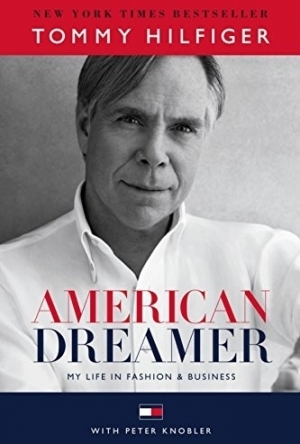
American Dreamer: My Life in Fashion & Business
Peter Knobler and Tommy Hilfiger
Book
In this tale of grit and glamour, setbacks and comebacks, business and pop culture icon Tommy...
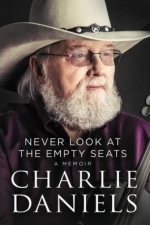
Never Look at the Empty Seats: A Memoir
Book
A tale of hard work, musical discovery, and faith, Charlie Daniels’s journey has been one of a...
Music biography
